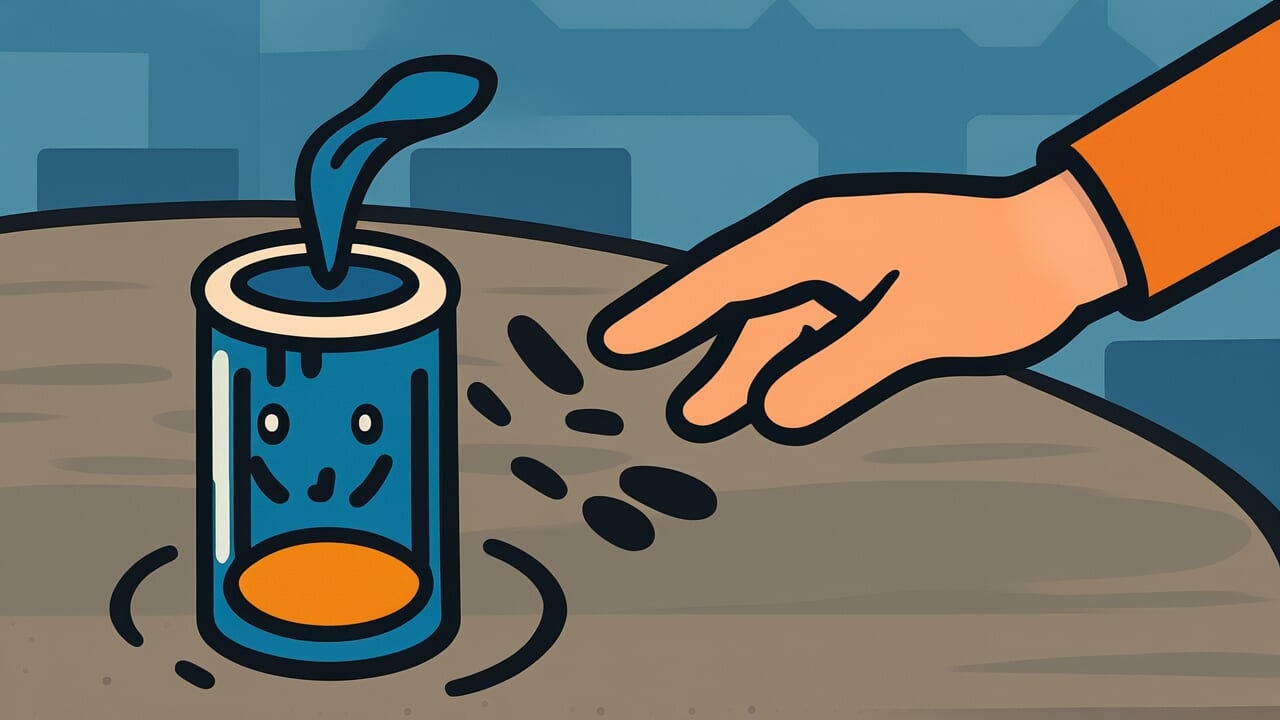How to Read “Spilling from a hand that has”
Aru te kara koboreru
Meaning of “Spilling from a hand that has”
“Spilling from a hand that has” is a proverb that warns us about losing what we already possess through carelessness or poor management. It teaches us to value what we currently have.
This proverb applies to situations where we neglect things we already own, like wealth, status, relationships, or health.
When we think “I’ve already got this, so I’m safe,” we stop making efforts to maintain it. That’s when we end up losing it.
Today, we tend to take for granted the things that are always around us. We don’t notice their value and treat them carelessly.
Trust at work, bonds with family, a healthy body—these are all things in “a hand that has.”
But if we don’t consciously cherish them, they will slip through our fingers before we know it.
This proverb teaches us a simple but profound truth. Obtaining something and maintaining it require different kinds of effort.
Origin and Etymology
There doesn’t seem to be a clear record of when this proverb first appeared in literature. However, we can guess how it came to be by looking at the structure of the words.
“A hand that has” represents a hand already holding something—a state of possession.
“Spilling” describes how liquids or small particles fall from a container. These two parts combine to vividly depict how we lose what we already hold.
In traditional Japanese life, people valued treating precious resources like rice and water with care.
The spirit of not wasting a single grain of rice or a drop of water was wisdom passed down from times when resources were scarce.
The sight of rice grains spilling from a container you’re holding must have been common in daily life.
From this everyday scene, the lesson about “losing what you’ve worked hard to obtain” likely emerged.
This proverb also seems to contain the spirit of knowing contentment: “Protect what you have rather than seeking what you don’t.”
Chasing after distant treasures while dropping the precious things in your hands—this proverb has been passed down as a warning against this human tendency.
Usage Examples
- The trust we built with our customers was lost like spilling from a hand that has
- Health is something that spills from a hand that has, so we must cherish it now
Universal Wisdom
The universal truth shown by “Spilling from a hand that has” is that humans are enthusiastic about “acquiring” but careless about “maintaining.”
Why do we let our guard down the moment we obtain something?
It’s because the human brain is designed to respond to “change.” When we’re acquiring something new, we feel excitement and anticipation, and all our nerves focus on it.
But once we obtain it, it becomes “ordinary” and we stop paying attention to it.
In romance or work, we’re desperate until we get what we want, but we stop trying once we have it. This is a human weakness that never changes across time and cultures.
Thinking more deeply, this proverb points to the psychological phenomenon of “the illusion of ownership.”
When we obtain something, we mistakenly believe it will be ours forever.
But in reality, everything is constantly changing, and continuous effort is needed to maintain it.
Health, relationships, and skills all decline if neglected.
Our ancestors understood this human nature well. That’s why they continued to convey the importance of maintenance through the visual image of “spilling from a hand that has.”
If you open your hand, things fall. If you don’t keep gripping, you can’t hold on.
This simple truth never fades, no matter how times change.
When AI Hears This
Claude Shannon, the founder of information theory, mathematically proved that every transmission channel has an absolute “capacity limit.”
For example, fiber optic cables have a limit to how much data they can transmit per second. The human hand is the same.
The physical space of a palm has an absolute upper limit to the amount of things it can hold.
What’s interesting here is Shannon’s law of “the inevitability of information loss.”
When transmitting information, if you pack it right up to the channel’s capacity, the loss rate from noise increases sharply.
In other words, operating at about 80 percent of capacity is most efficient.
The same principle works when holding things in your hand. When you grip things until your palm is full, you lose subtle finger control, making things more likely to spill.
A full state appears to be maximum capacity, but it’s actually the most unstable state.
Looking at it from the law of entropy, the more things you hold, the more “possibilities for disorder” increase exponentially.
Holding ten items versus three items multiplies the combinations of what you might drop many times over.
This is probabilistically unavoidable. A structure is built into this world where the more you hold, the more the probability of losing accelerates.
Lessons for Today
What this proverb teaches you today is the importance of “the ability to recognize the value of what you have now.”
We’re enthusiastic about pursuing new things, but don’t we tend to overlook the value of what we already have?
In modern society, new information and opportunities rush at us one after another.
Amid this, there’s a danger of taking for granted the job you have, the relationships you’re in, and your current health.
But these things are never maintained automatically. They require an accumulation of small daily considerations and efforts.
Specifically: expressing gratitude to important people, continuing to learn to maintain work quality, and maintaining regular habits for health.
These seemingly mundane daily efforts are what give you the strength to keep firmly gripping “a hand that has.”
This proverb asks you a question. What is in your hand right now? Are you holding it carefully?
Before pursuing new things, first reconfirm the value of what you have now.
That’s where true richness lies.



Comments